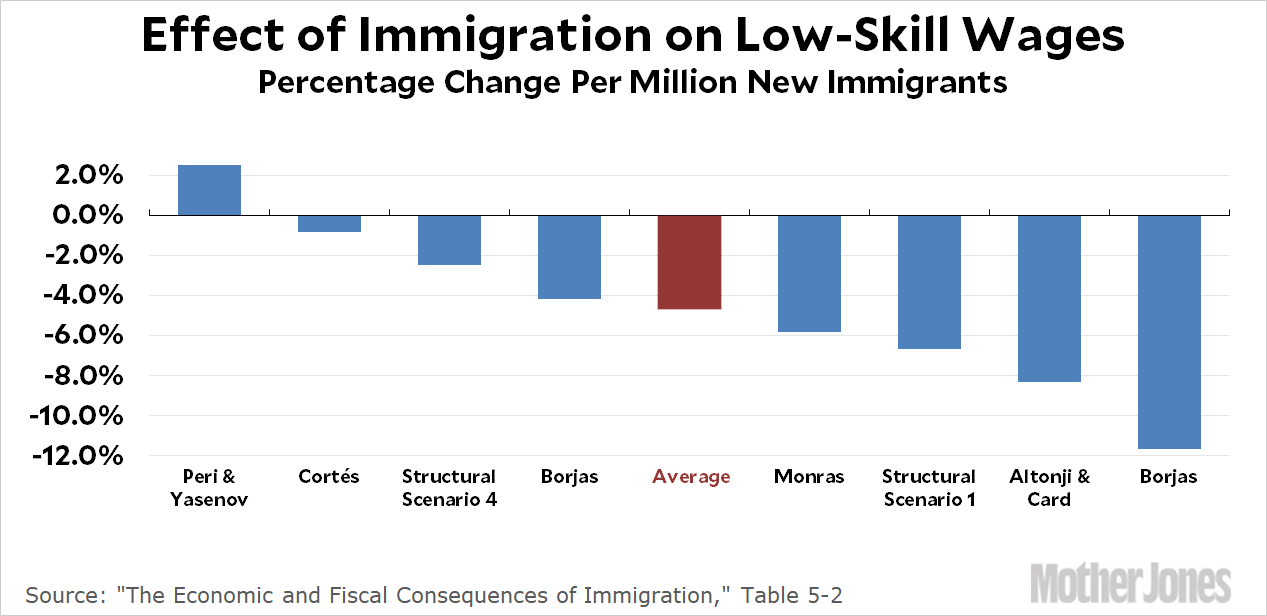Over at the Atlantic, Peter Beinart laments that liberals have become too doctrinaire over the past decade in their defense of illegal immigration:
Prominent liberals didn’t oppose immigration a decade ago. Most acknowledged its benefits to America’s economy and culture. They supported a path to citizenship for the undocumented. Still, they routinely asserted that low-skilled immigrants depressed the wages of low-skilled American workers and strained America’s welfare state. And they were far more likely than liberals today are to acknowledge that, as Krugman put it, “immigration is an intensely painful topic … because it places basic principles in conflict.”
Today, little of that ambivalence remains. In 2008, the Democratic platform…referred three times to people entering the country “illegally.” The immigration section of the 2016 platform didn’t use the word illegal, or any variation of it, at all.
Why did the left move even further left on immigration? Beinart chalks it up to politics: Democrats began to believe they’d dominate elections forever if they could sew up the Hispanic vote, and that motivated them to become ever less compromising on issues important to their Hispanic base.
I suppose that’s part of it, but I’m surprised that Beinart doesn’t mention the obvious: there have been two big attempts in the past decade to pass a moderate, compromise immigration bill. The first time was in 2006, when both the House and Senate passed bills by large margins. But thanks to a backlash from talk radio and social conservatives, the bills never went to conference and the effort died.
The second time was in 2013. A bill passed the Senate by a large, bipartisan majority, but once again it hit a backlash from the tea-party wing of the Republican Party. John Boehner never allowed the bill to come up for a vote in the House, and the effort died again.
These two episodes have made it clear that compromise on immigration is pointless. That being the case, why bother playing Hamlet about the effect of illegal immigration on the wages of low-skilled natives? Especially since it’s largely a red herring anyway: it’s true that undocumented immigrants have an impact on the wages of low-skill native workers, but the effect is pretty moderate.
UPDATE: My initial post used the wrong numbers for the effect of immigration on wages. The estimates below, along with the chart, have been corrected. Thanks to Jason Richwine for pointing out the error.
Beinart repeatedly mentions the findings of a National Academies of Sciences report on immigration and the economy, but never mentions the precise number it comes up with: for low-skill native workers, an average of all studies suggests that an influx of even a million immigrants would only lower wages about 4.6 percent in the short run.1

The same is true for state and local spending. The NAS report estimates that new immigrants cost states a net of about $1,600 per year.2 This means that an influx of a million immigrants would create a net burden of $1.6 billion. That’s less than one-tenth of one percent of all state and local spending. It’s a rounding error.
These numbers are small, and are used mostly as intellectual cover by opponents of illegal immigration. They are not even remotely the reason for opposition to comprehensive immigration reform, which comes mostly from educated native whites whose wages and taxes aren’t impacted more than a hair by illegal immigration. The real reason is almost purely cultural: dislike of non-English speakers, an inchoate fear of crime, and a vague sense that white America is fading away. But hardly anyone wants to admit that these are the real terms of the argument.
Quite a bit of new research has been done over the past decade, and the result has been, if anything, a reduction in the perceived economic effects of illegal immigration. The wage effects are roughly zero overall, and even for low-skill workers are fairly small in the short run—and get smaller over time. The fiscal effects are even smaller, and become zero over the long run. Given all this, it’s hardly a surprise that supporters of comprehensive immigration reform no longer give economic arguments much attention.31This is the average of all studies in Table 5-2 that focus on high school dropouts. The mean result was a wage effect of -0.56 percent for an increase in the low-skill labor supply of 1 percent, which amounts to about 120,000 workers. That comes to -4.66 percent per million new immigrants.
2Table 9-6.
3This is not the post I intended to write when I started out. But after reading the NAS report, it’s the one I ended up with. Maybe tomorrow I’ll write the post I originally had in mind.








